Employment Relations Report: Impact on Hospitality Industry Practices
VerifiedAdded on 2021/04/21
|7
|1559
|32
Report
AI Summary
This report delves into the intricacies of employment relations within the hospitality industry, examining both formal and informal rules and regulations that govern the employee-employer relationship. It emphasizes the importance of efficiency and equity, exploring how these concepts impact productivity and organizational well-being. The report outlines alternative approaches to employment relations, including neoclassical economics, human resource management, and Marxist perspectives, while also analyzing the unitarist, pluralist, and radical frameworks for conflict resolution. It highlights the significance of teamwork, adaptability, and digital tool proficiency in fostering a successful work environment. The analysis underscores the need for cordial employee-employer relations and the importance of equipping and rewarding employees based on their skills to ensure quality work output within the hospitality sector.
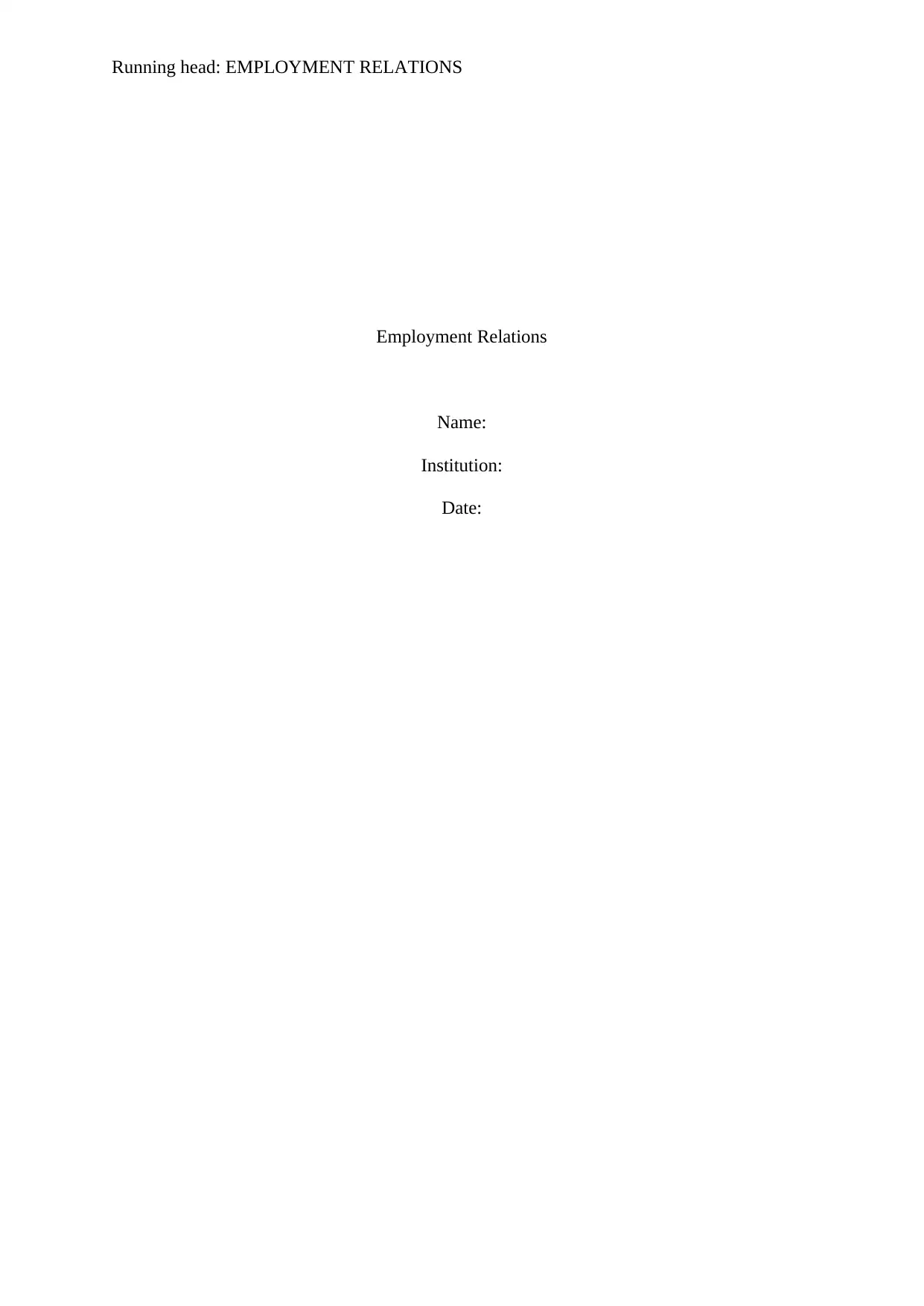
Running head: EMPLOYMENT RELATIONS
Employment Relations
Name:
Institution:
Date:
Employment Relations
Name:
Institution:
Date:
Paraphrase This Document
Need a fresh take? Get an instant paraphrase of this document with our AI Paraphraser
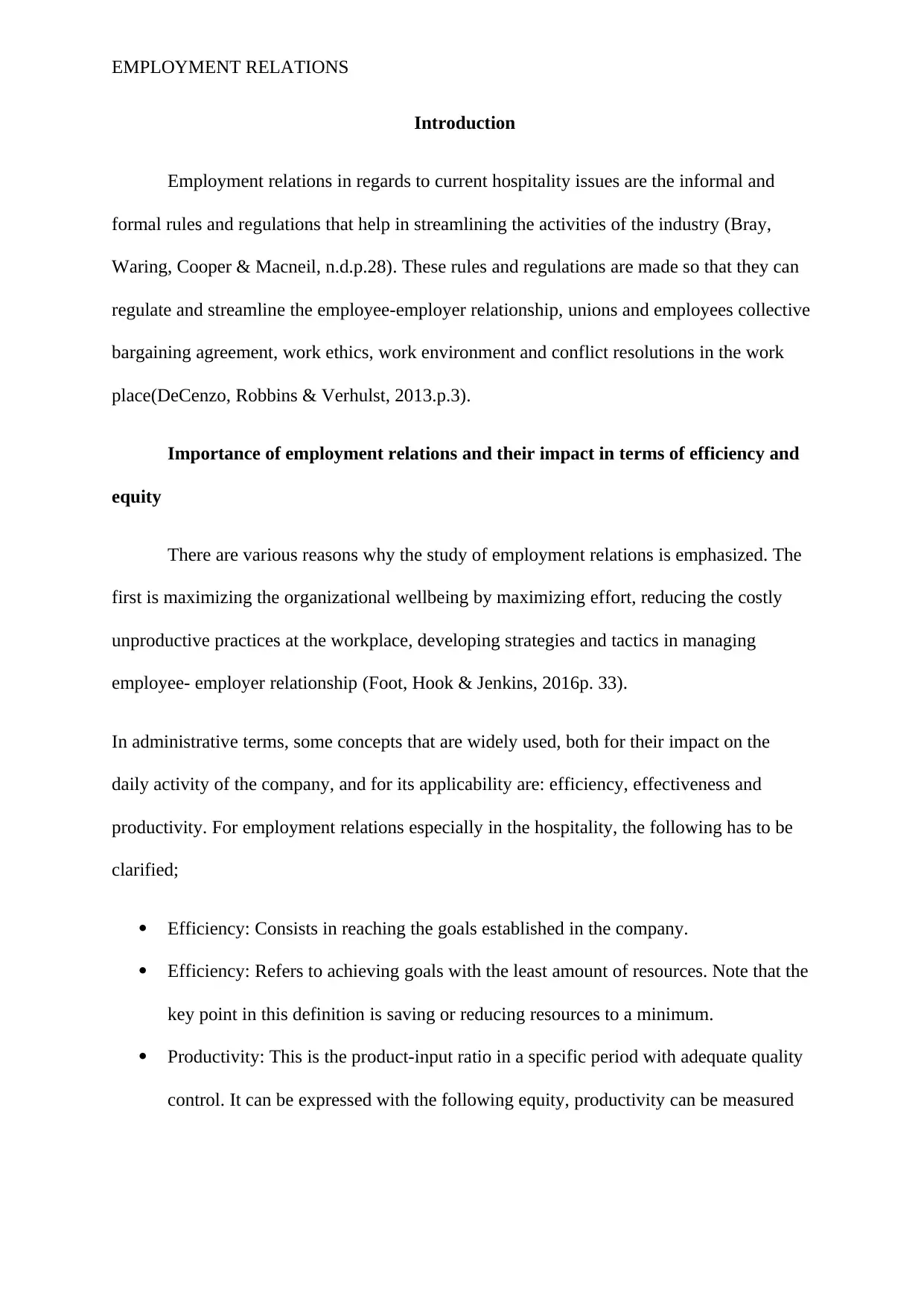
EMPLOYMENT RELATIONS
Introduction
Employment relations in regards to current hospitality issues are the informal and
formal rules and regulations that help in streamlining the activities of the industry (Bray,
Waring, Cooper & Macneil, n.d.p.28). These rules and regulations are made so that they can
regulate and streamline the employee-employer relationship, unions and employees collective
bargaining agreement, work ethics, work environment and conflict resolutions in the work
place(DeCenzo, Robbins & Verhulst, 2013.p.3).
Importance of employment relations and their impact in terms of efficiency and
equity
There are various reasons why the study of employment relations is emphasized. The
first is maximizing the organizational wellbeing by maximizing effort, reducing the costly
unproductive practices at the workplace, developing strategies and tactics in managing
employee- employer relationship (Foot, Hook & Jenkins, 2016p. 33).
In administrative terms, some concepts that are widely used, both for their impact on the
daily activity of the company, and for its applicability are: efficiency, effectiveness and
productivity. For employment relations especially in the hospitality, the following has to be
clarified;
Efficiency: Consists in reaching the goals established in the company.
Efficiency: Refers to achieving goals with the least amount of resources. Note that the
key point in this definition is saving or reducing resources to a minimum.
Productivity: This is the product-input ratio in a specific period with adequate quality
control. It can be expressed with the following equity, productivity can be measured
Introduction
Employment relations in regards to current hospitality issues are the informal and
formal rules and regulations that help in streamlining the activities of the industry (Bray,
Waring, Cooper & Macneil, n.d.p.28). These rules and regulations are made so that they can
regulate and streamline the employee-employer relationship, unions and employees collective
bargaining agreement, work ethics, work environment and conflict resolutions in the work
place(DeCenzo, Robbins & Verhulst, 2013.p.3).
Importance of employment relations and their impact in terms of efficiency and
equity
There are various reasons why the study of employment relations is emphasized. The
first is maximizing the organizational wellbeing by maximizing effort, reducing the costly
unproductive practices at the workplace, developing strategies and tactics in managing
employee- employer relationship (Foot, Hook & Jenkins, 2016p. 33).
In administrative terms, some concepts that are widely used, both for their impact on the
daily activity of the company, and for its applicability are: efficiency, effectiveness and
productivity. For employment relations especially in the hospitality, the following has to be
clarified;
Efficiency: Consists in reaching the goals established in the company.
Efficiency: Refers to achieving goals with the least amount of resources. Note that the
key point in this definition is saving or reducing resources to a minimum.
Productivity: This is the product-input ratio in a specific period with adequate quality
control. It can be expressed with the following equity, productivity can be measured
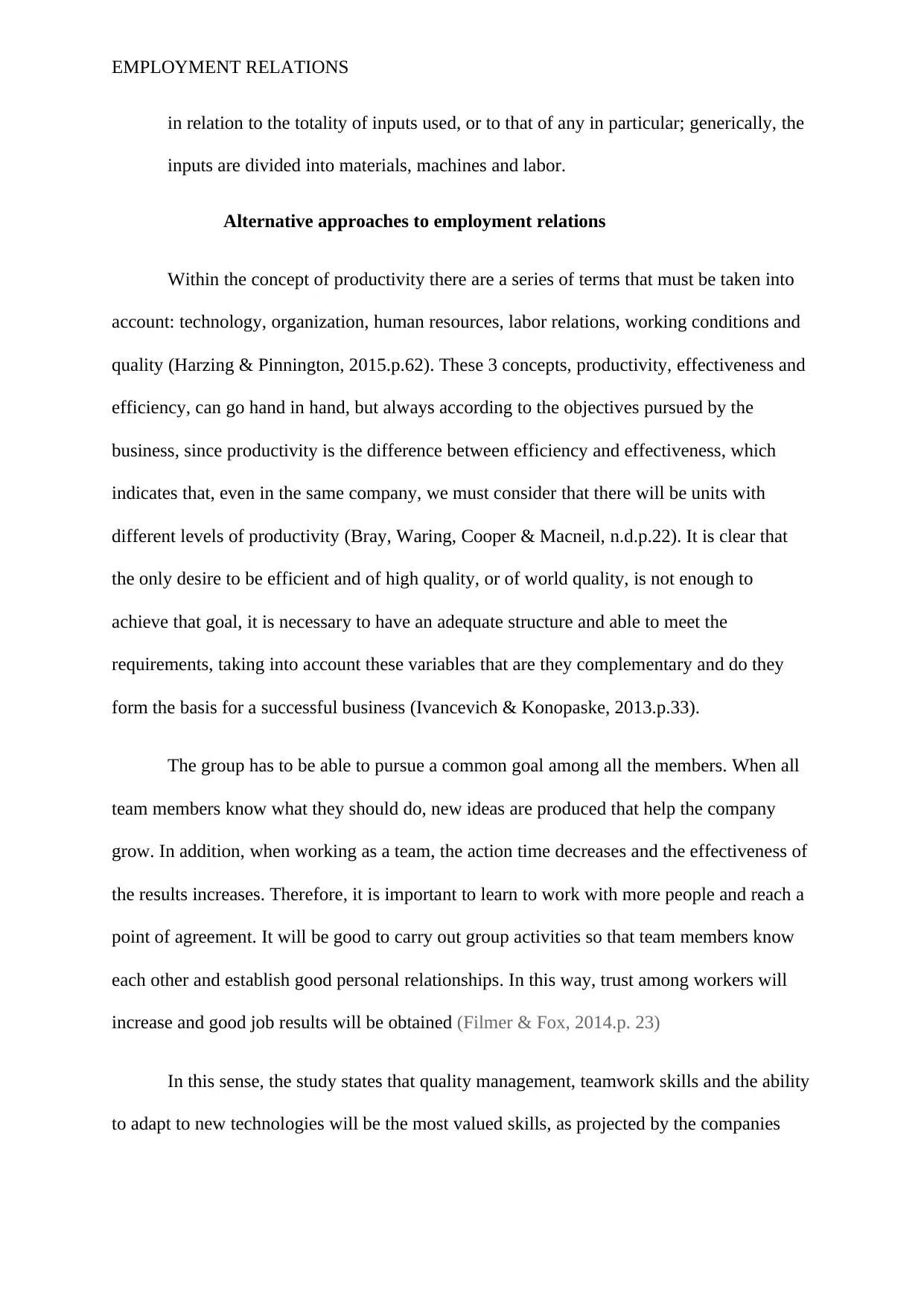
EMPLOYMENT RELATIONS
in relation to the totality of inputs used, or to that of any in particular; generically, the
inputs are divided into materials, machines and labor.
Alternative approaches to employment relations
Within the concept of productivity there are a series of terms that must be taken into
account: technology, organization, human resources, labor relations, working conditions and
quality (Harzing & Pinnington, 2015.p.62). These 3 concepts, productivity, effectiveness and
efficiency, can go hand in hand, but always according to the objectives pursued by the
business, since productivity is the difference between efficiency and effectiveness, which
indicates that, even in the same company, we must consider that there will be units with
different levels of productivity (Bray, Waring, Cooper & Macneil, n.d.p.22). It is clear that
the only desire to be efficient and of high quality, or of world quality, is not enough to
achieve that goal, it is necessary to have an adequate structure and able to meet the
requirements, taking into account these variables that are they complementary and do they
form the basis for a successful business (Ivancevich & Konopaske, 2013.p.33).
The group has to be able to pursue a common goal among all the members. When all
team members know what they should do, new ideas are produced that help the company
grow. In addition, when working as a team, the action time decreases and the effectiveness of
the results increases. Therefore, it is important to learn to work with more people and reach a
point of agreement. It will be good to carry out group activities so that team members know
each other and establish good personal relationships. In this way, trust among workers will
increase and good job results will be obtained (Filmer & Fox, 2014.p. 23)
In this sense, the study states that quality management, teamwork skills and the ability
to adapt to new technologies will be the most valued skills, as projected by the companies
in relation to the totality of inputs used, or to that of any in particular; generically, the
inputs are divided into materials, machines and labor.
Alternative approaches to employment relations
Within the concept of productivity there are a series of terms that must be taken into
account: technology, organization, human resources, labor relations, working conditions and
quality (Harzing & Pinnington, 2015.p.62). These 3 concepts, productivity, effectiveness and
efficiency, can go hand in hand, but always according to the objectives pursued by the
business, since productivity is the difference between efficiency and effectiveness, which
indicates that, even in the same company, we must consider that there will be units with
different levels of productivity (Bray, Waring, Cooper & Macneil, n.d.p.22). It is clear that
the only desire to be efficient and of high quality, or of world quality, is not enough to
achieve that goal, it is necessary to have an adequate structure and able to meet the
requirements, taking into account these variables that are they complementary and do they
form the basis for a successful business (Ivancevich & Konopaske, 2013.p.33).
The group has to be able to pursue a common goal among all the members. When all
team members know what they should do, new ideas are produced that help the company
grow. In addition, when working as a team, the action time decreases and the effectiveness of
the results increases. Therefore, it is important to learn to work with more people and reach a
point of agreement. It will be good to carry out group activities so that team members know
each other and establish good personal relationships. In this way, trust among workers will
increase and good job results will be obtained (Filmer & Fox, 2014.p. 23)
In this sense, the study states that quality management, teamwork skills and the ability
to adapt to new technologies will be the most valued skills, as projected by the companies
⊘ This is a preview!⊘
Do you want full access?
Subscribe today to unlock all pages.

Trusted by 1+ million students worldwide
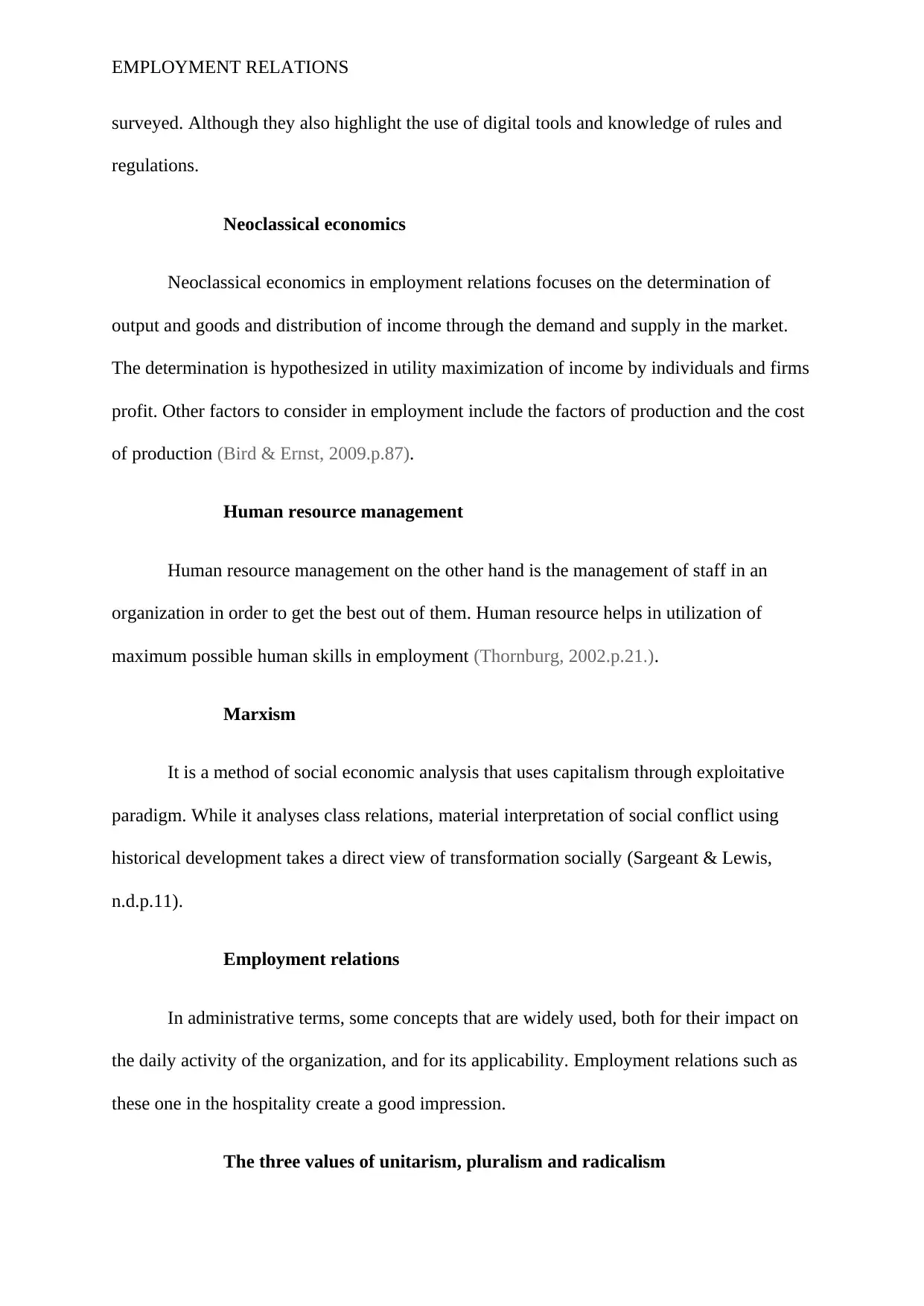
EMPLOYMENT RELATIONS
surveyed. Although they also highlight the use of digital tools and knowledge of rules and
regulations.
Neoclassical economics
Neoclassical economics in employment relations focuses on the determination of
output and goods and distribution of income through the demand and supply in the market.
The determination is hypothesized in utility maximization of income by individuals and firms
profit. Other factors to consider in employment include the factors of production and the cost
of production (Bird & Ernst, 2009.p.87).
Human resource management
Human resource management on the other hand is the management of staff in an
organization in order to get the best out of them. Human resource helps in utilization of
maximum possible human skills in employment (Thornburg, 2002.p.21.).
Marxism
It is a method of social economic analysis that uses capitalism through exploitative
paradigm. While it analyses class relations, material interpretation of social conflict using
historical development takes a direct view of transformation socially (Sargeant & Lewis,
n.d.p.11).
Employment relations
In administrative terms, some concepts that are widely used, both for their impact on
the daily activity of the organization, and for its applicability. Employment relations such as
these one in the hospitality create a good impression.
The three values of unitarism, pluralism and radicalism
surveyed. Although they also highlight the use of digital tools and knowledge of rules and
regulations.
Neoclassical economics
Neoclassical economics in employment relations focuses on the determination of
output and goods and distribution of income through the demand and supply in the market.
The determination is hypothesized in utility maximization of income by individuals and firms
profit. Other factors to consider in employment include the factors of production and the cost
of production (Bird & Ernst, 2009.p.87).
Human resource management
Human resource management on the other hand is the management of staff in an
organization in order to get the best out of them. Human resource helps in utilization of
maximum possible human skills in employment (Thornburg, 2002.p.21.).
Marxism
It is a method of social economic analysis that uses capitalism through exploitative
paradigm. While it analyses class relations, material interpretation of social conflict using
historical development takes a direct view of transformation socially (Sargeant & Lewis,
n.d.p.11).
Employment relations
In administrative terms, some concepts that are widely used, both for their impact on
the daily activity of the organization, and for its applicability. Employment relations such as
these one in the hospitality create a good impression.
The three values of unitarism, pluralism and radicalism
Paraphrase This Document
Need a fresh take? Get an instant paraphrase of this document with our AI Paraphraser
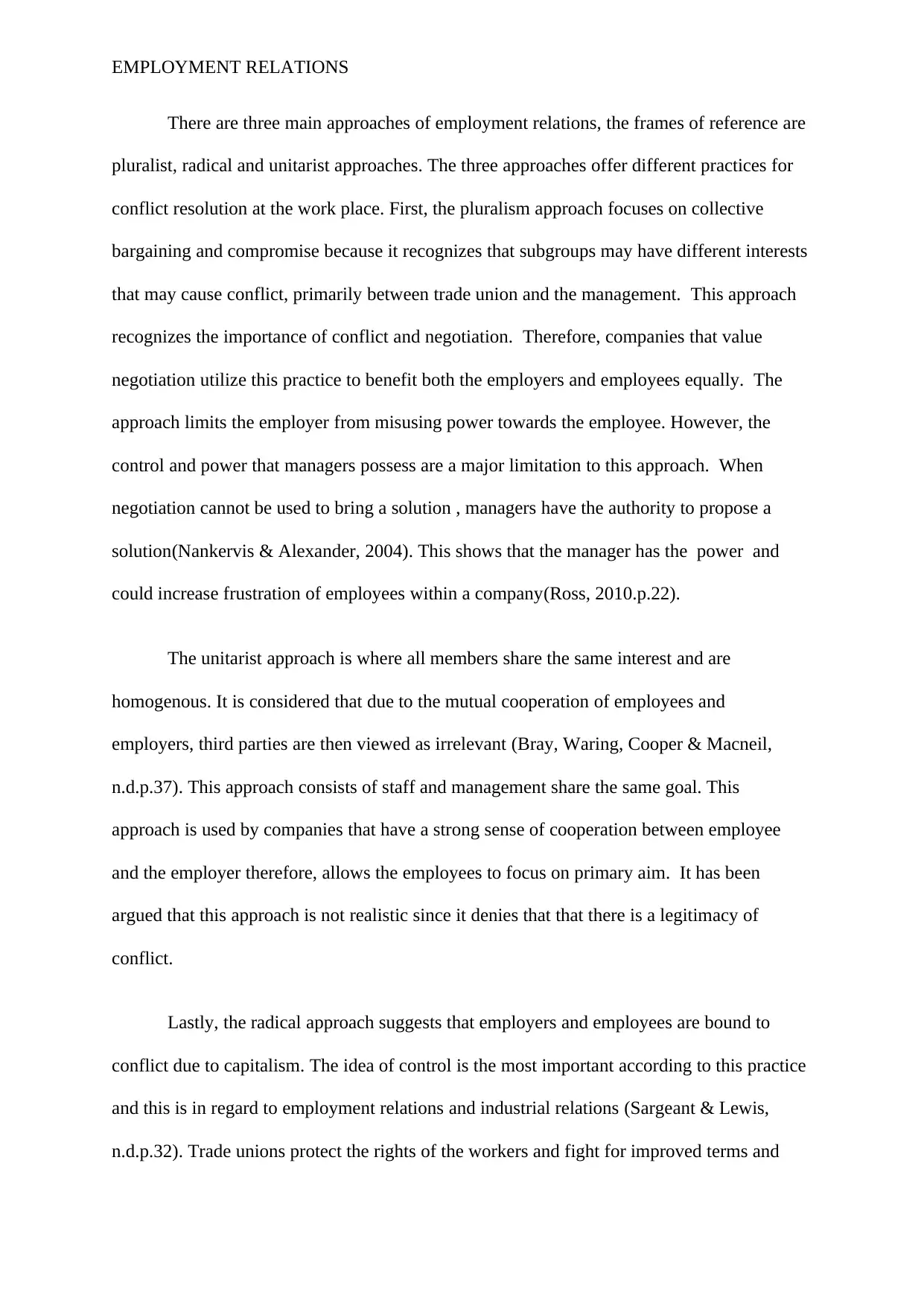
EMPLOYMENT RELATIONS
There are three main approaches of employment relations, the frames of reference are
pluralist, radical and unitarist approaches. The three approaches offer different practices for
conflict resolution at the work place. First, the pluralism approach focuses on collective
bargaining and compromise because it recognizes that subgroups may have different interests
that may cause conflict, primarily between trade union and the management. This approach
recognizes the importance of conflict and negotiation. Therefore, companies that value
negotiation utilize this practice to benefit both the employers and employees equally. The
approach limits the employer from misusing power towards the employee. However, the
control and power that managers possess are a major limitation to this approach. When
negotiation cannot be used to bring a solution , managers have the authority to propose a
solution(Nankervis & Alexander, 2004). This shows that the manager has the power and
could increase frustration of employees within a company(Ross, 2010.p.22).
The unitarist approach is where all members share the same interest and are
homogenous. It is considered that due to the mutual cooperation of employees and
employers, third parties are then viewed as irrelevant (Bray, Waring, Cooper & Macneil,
n.d.p.37). This approach consists of staff and management share the same goal. This
approach is used by companies that have a strong sense of cooperation between employee
and the employer therefore, allows the employees to focus on primary aim. It has been
argued that this approach is not realistic since it denies that that there is a legitimacy of
conflict.
Lastly, the radical approach suggests that employers and employees are bound to
conflict due to capitalism. The idea of control is the most important according to this practice
and this is in regard to employment relations and industrial relations (Sargeant & Lewis,
n.d.p.32). Trade unions protect the rights of the workers and fight for improved terms and
There are three main approaches of employment relations, the frames of reference are
pluralist, radical and unitarist approaches. The three approaches offer different practices for
conflict resolution at the work place. First, the pluralism approach focuses on collective
bargaining and compromise because it recognizes that subgroups may have different interests
that may cause conflict, primarily between trade union and the management. This approach
recognizes the importance of conflict and negotiation. Therefore, companies that value
negotiation utilize this practice to benefit both the employers and employees equally. The
approach limits the employer from misusing power towards the employee. However, the
control and power that managers possess are a major limitation to this approach. When
negotiation cannot be used to bring a solution , managers have the authority to propose a
solution(Nankervis & Alexander, 2004). This shows that the manager has the power and
could increase frustration of employees within a company(Ross, 2010.p.22).
The unitarist approach is where all members share the same interest and are
homogenous. It is considered that due to the mutual cooperation of employees and
employers, third parties are then viewed as irrelevant (Bray, Waring, Cooper & Macneil,
n.d.p.37). This approach consists of staff and management share the same goal. This
approach is used by companies that have a strong sense of cooperation between employee
and the employer therefore, allows the employees to focus on primary aim. It has been
argued that this approach is not realistic since it denies that that there is a legitimacy of
conflict.
Lastly, the radical approach suggests that employers and employees are bound to
conflict due to capitalism. The idea of control is the most important according to this practice
and this is in regard to employment relations and industrial relations (Sargeant & Lewis,
n.d.p.32). Trade unions protect the rights of the workers and fight for improved terms and
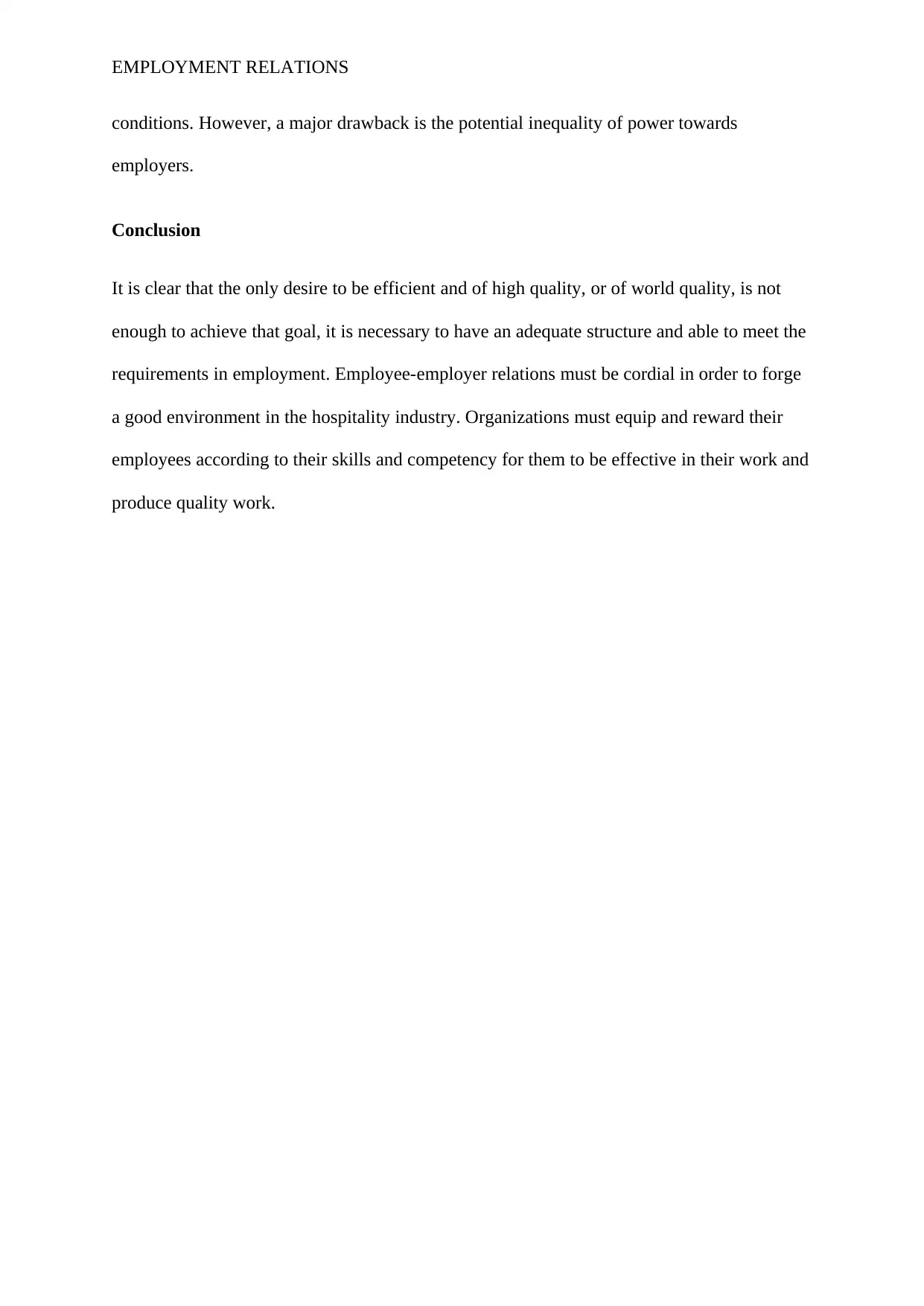
EMPLOYMENT RELATIONS
conditions. However, a major drawback is the potential inequality of power towards
employers.
Conclusion
It is clear that the only desire to be efficient and of high quality, or of world quality, is not
enough to achieve that goal, it is necessary to have an adequate structure and able to meet the
requirements in employment. Employee-employer relations must be cordial in order to forge
a good environment in the hospitality industry. Organizations must equip and reward their
employees according to their skills and competency for them to be effective in their work and
produce quality work.
conditions. However, a major drawback is the potential inequality of power towards
employers.
Conclusion
It is clear that the only desire to be efficient and of high quality, or of world quality, is not
enough to achieve that goal, it is necessary to have an adequate structure and able to meet the
requirements in employment. Employee-employer relations must be cordial in order to forge
a good environment in the hospitality industry. Organizations must equip and reward their
employees according to their skills and competency for them to be effective in their work and
produce quality work.
⊘ This is a preview!⊘
Do you want full access?
Subscribe today to unlock all pages.

Trusted by 1+ million students worldwide
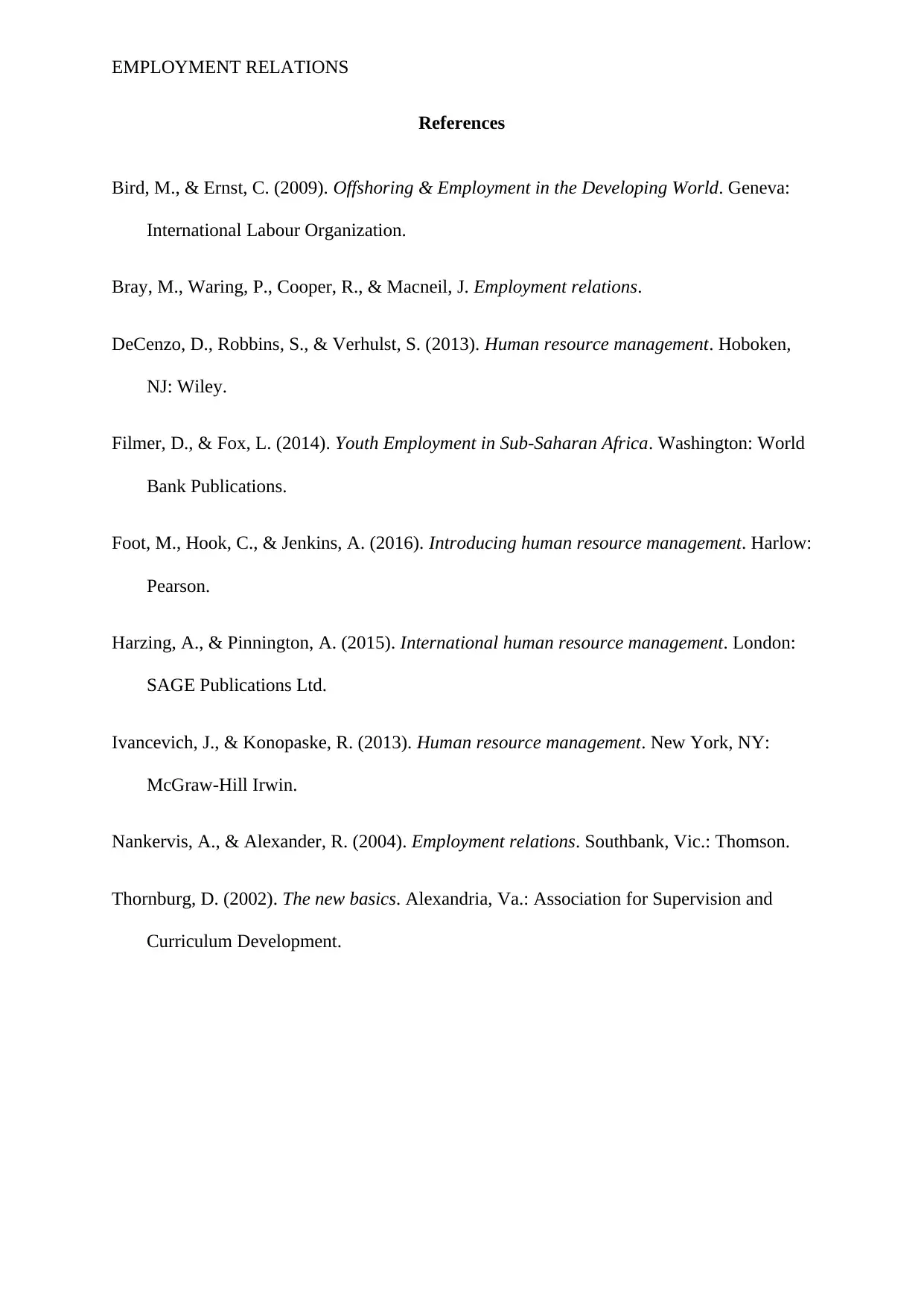
EMPLOYMENT RELATIONS
References
Bird, M., & Ernst, C. (2009). Offshoring & Employment in the Developing World. Geneva:
International Labour Organization.
Bray, M., Waring, P., Cooper, R., & Macneil, J. Employment relations.
DeCenzo, D., Robbins, S., & Verhulst, S. (2013). Human resource management. Hoboken,
NJ: Wiley.
Filmer, D., & Fox, L. (2014). Youth Employment in Sub-Saharan Africa. Washington: World
Bank Publications.
Foot, M., Hook, C., & Jenkins, A. (2016). Introducing human resource management. Harlow:
Pearson.
Harzing, A., & Pinnington, A. (2015). International human resource management. London:
SAGE Publications Ltd.
Ivancevich, J., & Konopaske, R. (2013). Human resource management. New York, NY:
McGraw-Hill Irwin.
Nankervis, A., & Alexander, R. (2004). Employment relations. Southbank, Vic.: Thomson.
Thornburg, D. (2002). The new basics. Alexandria, Va.: Association for Supervision and
Curriculum Development.
References
Bird, M., & Ernst, C. (2009). Offshoring & Employment in the Developing World. Geneva:
International Labour Organization.
Bray, M., Waring, P., Cooper, R., & Macneil, J. Employment relations.
DeCenzo, D., Robbins, S., & Verhulst, S. (2013). Human resource management. Hoboken,
NJ: Wiley.
Filmer, D., & Fox, L. (2014). Youth Employment in Sub-Saharan Africa. Washington: World
Bank Publications.
Foot, M., Hook, C., & Jenkins, A. (2016). Introducing human resource management. Harlow:
Pearson.
Harzing, A., & Pinnington, A. (2015). International human resource management. London:
SAGE Publications Ltd.
Ivancevich, J., & Konopaske, R. (2013). Human resource management. New York, NY:
McGraw-Hill Irwin.
Nankervis, A., & Alexander, R. (2004). Employment relations. Southbank, Vic.: Thomson.
Thornburg, D. (2002). The new basics. Alexandria, Va.: Association for Supervision and
Curriculum Development.
1 out of 7
Your All-in-One AI-Powered Toolkit for Academic Success.
+13062052269
info@desklib.com
Available 24*7 on WhatsApp / Email
![[object Object]](/_next/static/media/star-bottom.7253800d.svg)
Unlock your academic potential
Copyright © 2020–2025 A2Z Services. All Rights Reserved. Developed and managed by ZUCOL.

